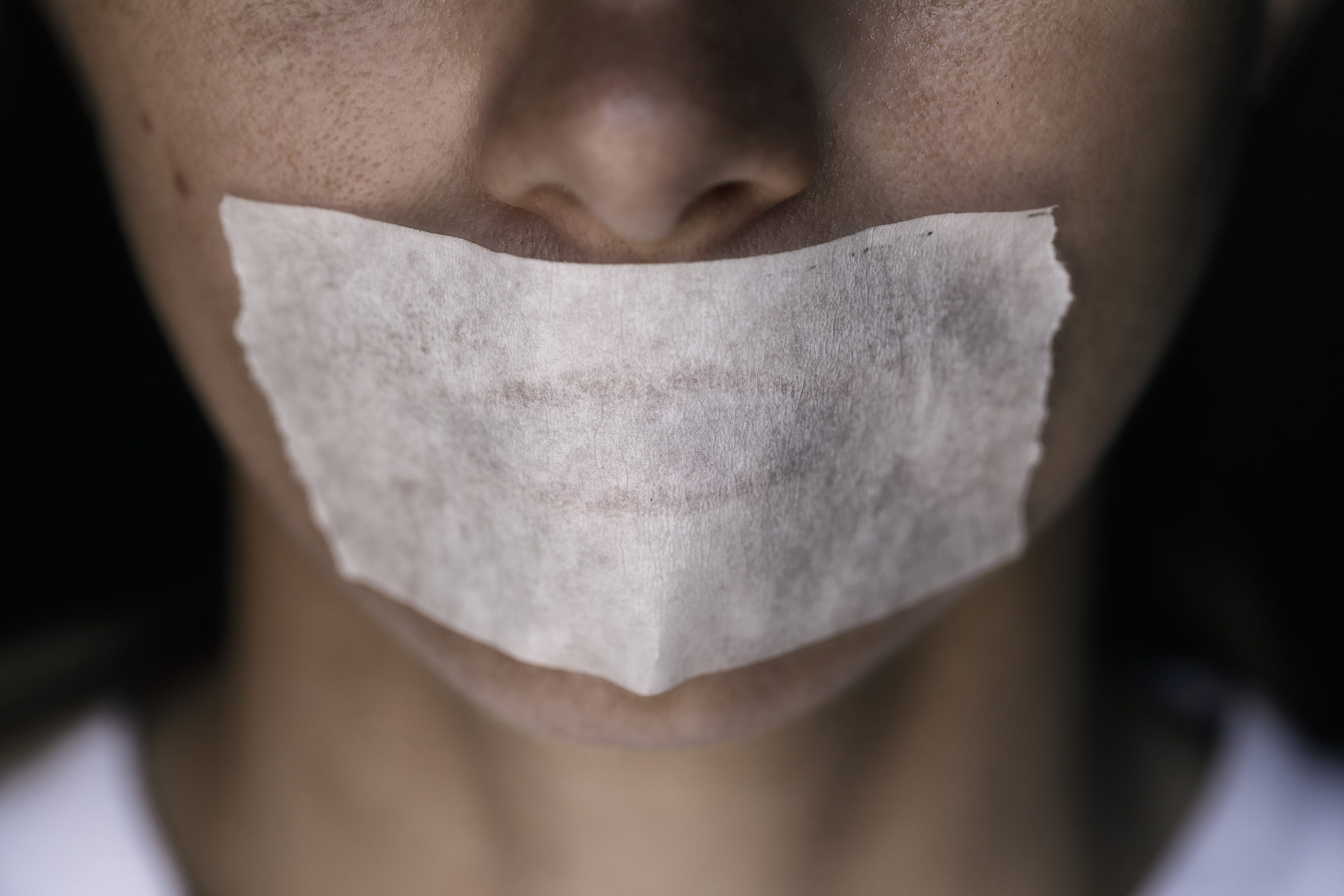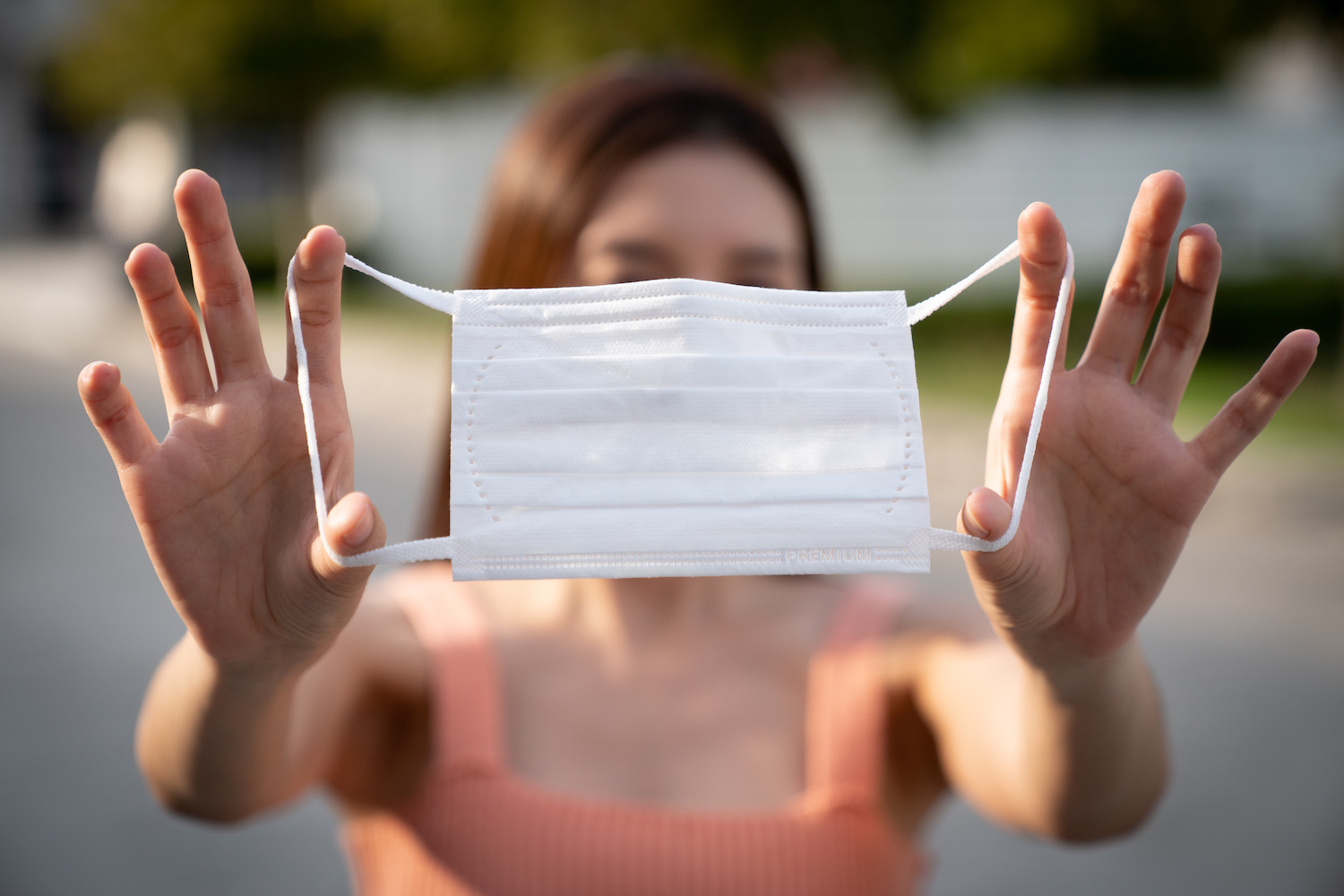Originally published July 4, 2020, on Medium. Article has been slightly abridged.
During the COVID-19 pandemic, antimaskers loudly proclaim their opposition to some states’ mandatory mask wearing. They cite a small range of reasons from “It’s my Constitutional right” to “The government is trying to control us.” But a simple scratch and sniff shows how flimsy their arguments are.
The main arguments of the antimaskers, which you can find posted all over social media, can be enumerated as follows:
- Mandatory mask wearing is the beginning of an erosion of civil rights that is equivalent to tyranny.
- Mandatory mask wearing threatens free speech.
- Refusing to wear a mask is inherently American and is a righteous act of rebellion.
Let’s examine each argument.
Mandatory Mask Wearing Is the Beginning of an Erosion of Civil Rights

This argument is the same slippery-slope argument used by the gun lobby to confront gun regulation. The idea is, if we cave on this one, then eventually we will end up with chips implanted in our brains. The people who offer this argument seem genuinely fearful of a dystopian world of mind-control and enforced homogeneity. (It should be pointed out here that a mask does not affect your ability to think, as it covers your mouth and does not enshroud your brain.)
This fear of enforced homogeneity is deeply rooted in our national psyche. Politicians have used it for decades, often directing it at Communism and Socialism, sometimes directing it at diversity and inclusion efforts in education, once directed at efforts to end slavery. The idea goes something like this: They want to end our American way of life. They want to restrict my rights.
What Rights Do We Have? We must consider whether refusal to wear a mask is indeed a civil right. The Bill of Rights lists the first ten amendments to the Constitution. In the Bill of Rights there is nothing about masks or any other kind of body covering.
Some people point to Right #5 as support for antimasking. That one goes like this:
- V. No person shall be . . . deprived of life, liberty, or property, without due process of law; nor shall private property be taken for public use, without just compensation.
Mandatory mask wearing cannot be covered by “deprivation of life, liberty, or property” any more than the required wearing of clothes can be considered a deprivation. Having a permanently uncovered mouth and nose has not been shown by any court to be an inherent liberty. The still most applicable court ruling dates to 1905 in Jacobson v. Massachusetts. Regarding an outbreak of smallpox, the U.S. Supreme Court ruled, “Upon the principle of self-defense, of paramount necessity, a community has the right to protect itself against an epidemic of disease which threatens the safety of its members.”
The only other amendments that require further examination for our purposes are Amendments IX and X, because they allow for other rights not specifically listed in the Bill of Rights. So we need to look at the Consitution itself. Let me spare you the trouble: It’s dry reading and is limited to taxation, voting, branches of government, impeachment, issues of treason, and the like. The main part of the Constitution does not discuss individual liberties and certainly says not a thing about masks or anything else you might wear. If you don’t believe me, have at it.
In addition to the Bill of Rights, the Civil Rights Act of 1964 ensures other rights that you can see here. None has any connection to mask wearing.
What About Other Rules We Follow? I wonder why mask wearing in particular is so upsetting. Are there Facebook groups that protest having to wear a shirt or shoes when they enter a store? (Probably.) Is there similar uproar against rules preventing dogs from accompanying their humans into establishments? Isn’t having to have a license plate a more dangerous requirement, as it enables governmental authorities to track people’s movements? Where is that group?
My biggest confusion is over why antimaskers think they have a Constitutional right not to follow a particular health and safety regulation, when in all likelihood they go along with other similar regulations. Presumably, although I can’t be sure of this, they drive on the right side of the road, try not to hit cyclists, occasionally use a signal. If they are required to, I’m assuming they wear corrective lenses when driving. They probably refrain from using napalm on weeds, even in their own backyards, because the use of napalm is prohibited. Do they refuse to use the tongs to select a cookie at the bakery? Do they refuse to tie an orange flag to the lumber sticking out of the back of the truck?
Are any food service employees among them not washing their hands? (Insert vomit.) What about exposing yourself? Are regulations against bodily exposure also something to buck up against?
Mandatory Mask Wearing Threatens Free Speech

How does a mask inhibit free speech? Is it a muzzle? True, I do have more trouble hearing the clerk at the grocery store when we’re both wearing maks. But the clerk still has the ability to shout out, “Your card was declined,” so I’m not sure how the mask is preventing free speech.
You have the right to wear T-shirts with offensive slogans, ugly clothes, sock and sandals at the same time, crop tops, dumb hats, tattoos, piercings. You are legally able to wear fur, you can squeeze into leather pants. You may shave your eyebrows or paint in fake ones. You can even wear any style of mask that you want as long as it covers your nose and mouth. And, if you have a for-real health condition that makes mask wearing difficult or dangerous for you, you do not have to wear one.
Refusing to Wear a Mask is Inherently American and Is a Righteous Act of Rebellion

The equating of nonmasking with rebellion and the American Revolution is confusing to say the least. For one thing, the British never made anyone wear masks, at least that I know of. The big issue leading up to the Revolutionary War was taxation without representation (coincidentally, the members of the Boston Tea Party wore masks of a type — they camouflaged themselves as Indigenous people to cast the blame on them), and while that is certainly still happening in our country at this moment, antimaskers aren’t talking about it. Instead, they’re in a lather over having to wear a small rectangle of fabric over their mouths and noses.
Perhaps people reason that, if the President and the Vice-President refuse to wear masks, why should they have to? Well, just because a leader is selfish or ignorant or corrupt, doesn’t mean we all have to be. Maybe people see that leader as somehow admiringly rebellious, like an older, unhot, all-American Jim Stark. But how it is admirable to risk other people’s health? Not wearing a mask is, in fact, reckless and just a hollow symbol of pointless rebelliousness, not a meaningful, worthwhile statement.
Final Thoughts

As discussed, wearing a mask is just one regulation among plenty of others that people do follow, seemingly willingly. Why are antimaskers making such a big deal out of being required to wear a mask for a short time?
For decades women were expected to crumple their rib cages with corsets. Children have had to wear scratchy school uniforms. Men bind their necks with ties. Women treat their hair with hideous chemicals. When did we become so soft that a small, temporary facial covering started to feel onerous? Note that no one is preventing men from trimming their beards or requiring women to wear burkas. This is just a small face mask, and it’s just for a short time.
I think part of the antimasking sentiment is that people are seeing the mask as a metaphor and not as a literal piece of personal protective equipment. A mask is metaphorically like a hand clasped over a mouth—but only metaphorically. It is absolutely nothing at all like actual tyranny, and anyone who thinks it is lacks imagination or doesn’t like to read.
Some antimaskers also try to argue logic as the reason not to wear a mask, saying that, if people have to wear a mask, then businesses should also be closed or that, if a mask traps infectious agents from the wearer, then it is actually more dangerous to the wearer than not wearing one.
But these arguments are actually illogical, and none of them is reason not to wear a mask. If wearing a mask helps and if it can be done while some businesses are partly open, then wouldn’t that be better for everyone? Also, masks, as has been pointed out many times by many experts, protect the wearer and others. So if you’re sick, the mask keeps your germs from getting to me, as does my mask. If I’m sick, my mask and your mask protect you. Since COVID-19 can lie undetected, masks are really the best way to make sure everyone is more safe.
We need in moments of crisis, like this one brought on by COVID-19, to separate our metaphorical fears from our very real challenges. If science proves that a mask can help save lives, and it has, and if wearing such a mask does not actually impede civil rights (as shown) and, at most, causes some mild, temporary discomfort (unless you have a relevant medical condition, as noted), then why wouldn’t people wear one? The answer can only be that (a) they care more about their own comfort than about the health of their fellow Americans and/or (b) they like to think of themselves as rebels.
If either is the case, nothing anyone can say will change their minds. In our country people still have the right to be selfish asses. And state governments still have the right to fine them for that idiocy.
Remember that there are plenty of existing legitimate reasons to rebel, such as not having your vote count or being unfairly targeted by the police or a president whose every move is intended solely to increase the wealth of the one percent, at any cost. Antimaskers choose to overlook these actual signs of impending tyranny to focus on one small act that is intended to help us all survive.

